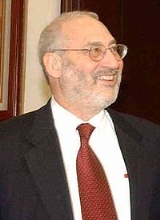
, (born February 9, 1943) is an American
economist
and a professor at Columbia University
. He is a recipient of the Nobel Memorial Prize in Economic Sciences
(2001) and the John Bates Clark Medal
(1979). He is also the former Senior Vice President and Chief Economist
of the World Bank
. He is known for his critical view of the management of globalization
, free-market economists (whom he calls "free market fundamentalists
") and some international institutions like the International Monetary Fund
and the World Bank
.
In 2000, Stiglitz founded the Initiative for Policy Dialogue
(IPD), a think tank
on international development based at Columbia University.
There must have been something in the air of Gary, Indiana|Gary that led one into economics: the first Nobel Prize winner, Paul Samuelson|Paul Samuelson, was also from Gary, as were several other distinguished economists... Certainly, the poverty, the discrimination, the episodic unemployment could not but strike an inquiring youngster: why did these exist, and what could we do about them.
![]()
My teachers helped guide and motivate me; but the responsibility of learning was left with me.
![]()
In debate, one randomly was assigned to one side or the other. This had at least one virtue — it made one see that there was more than one side to these complex issues.
![]()
The notion that every well educated person would have a mastery of at least the basic elements of the humanities, sciences, and social sciences is a far cry from the specialized education that most students today receive, particularly in the research universities.
![]()
The best teachers still taught in a Socratic style, asking questions, responding to the answers with still another question. And in all of our courses, we were taught that what mattered most was asking the right question — having posed the question well, answering the question was often a relatively easy matter.
![]()

